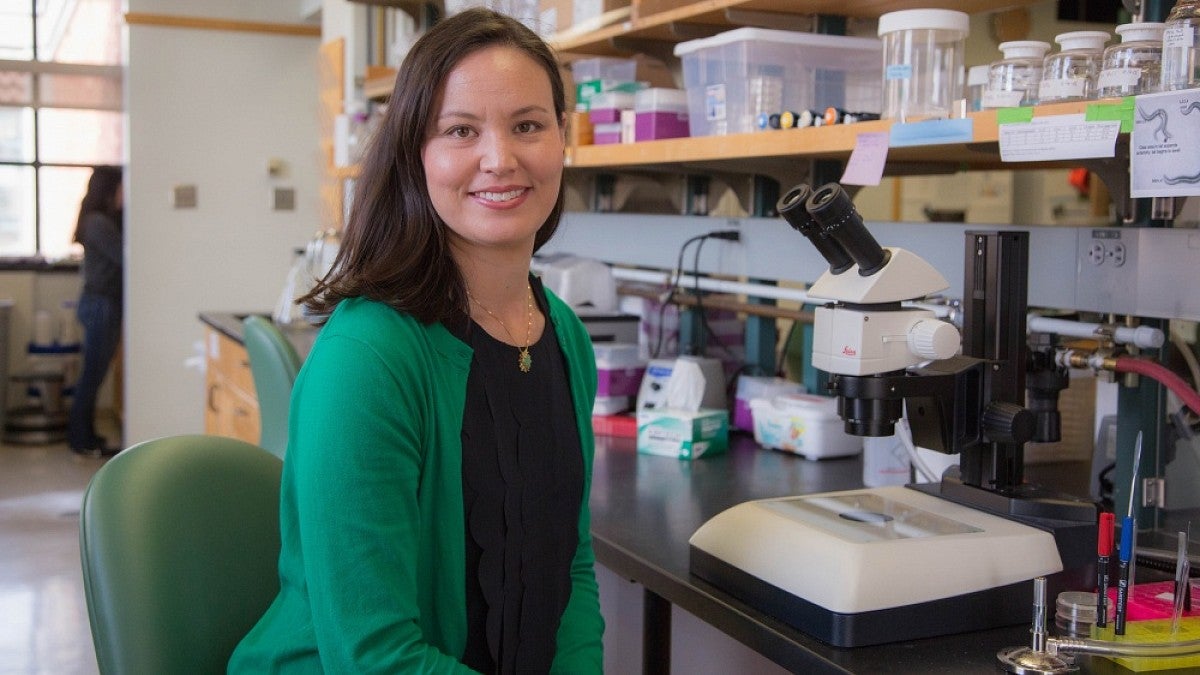University of Oregon DNA researcher Diana Libuda, an assistant professor in the Department of Biology and the Institute of Molecular Biology, has been named a 2017 Searle Scholar.
The award is handed out each year to 15 “exceptional young faculty in the biomedical sciences and chemistry,” according to the Searle program description. Searle scholars each receive $300,000 in flexible funding to support independent research over three years.
Libuda’s lab focuses on how DNA is repaired during sperm and egg development to ensure genome inheritance from one generation to another and utilizes the roundworm C. elegans as a model system. Libuda was selected from a field of 196 applicants from 143 universities and research institutions.
“It’s a huge honor,” Libuda said. “The people who have received this award, both here at the UO and elsewhere, is a list of very prestigious scientists. I was thrilled and excited to be recognized and in that same echelon of people.
Libuda came to the UO in January 2015 after serving as a postdoctoral fellow at Stanford University.
“This is an outstanding accomplishment that places professor Libuda among the top young researchers in the nation in biomedical and chemical sciences,” said David Conover, the UO’s vice president for research and innovation. “We are extremely proud of her achievement and we look forward to seeing the results of the research that will follow from this award.”
For her Searle project, Libuda will try to find out why a temperature increase can cause damage during sperm development.
The project, which Libuda calls her “crazy side project,” is in keeping with the Searle Scholar Program’s emphasis on high-risk, high-reward research. It’s a secondary project she’s pursued for years. The Searle Scholar award allows her to devote more time and energy to the research.
“Sperm development is the only process that requires a temperature lower than basal body temperature and is very sensitive to small changes in temperature,” Libuda said. “If you have an increase in temperature you will not be fertile.”
Some of the conditions that create this infertility include varicocele, a condition that affects 15-20 percent of the population and is responsible for 40 percent of primary male infertility. Libuda says the problem has been difficult to study in mammals because egg development only happens in the fetus.
She is proposing using the C. elegans model to study the problem. Models like C. elegans reveal basic cellular processes that occur in mammals and nonmammals alike.
“We have a whole set of genetic and cell visualization tools to really get at the mechanism of how this process is occurring,” Libuda said.
Libuda received her doctorate from Harvard University and her bachelor’s degree summa cum laude at UCLA in molecular, cell and developmental biology with a music history minor. She is a key member of the Center for Genome Function, a group of molecular biologists studying fundamental problems in genetics and epigenetics.
The center is part of the Clusters of Excellence program, which supports President Michael Schill’s goal to hire an additional 80 to 100 faculty members over the next five years to boost UO academics and research.
Before Libuda, the last UO researcher to be named as a Searle Scholar was Cris Niell, an assistant professor of biology, who received the award in 2012. Other UO faculty members to receive Searle honors include biologist Judith Eisen in 1986, chemist Diana Hawley in 1987, neuroscientist Shawn Lockery in 1994 and biochemist Tom Stevens in 1984.
UO developmental biologist and neuroscientist Chris Doe received the award in 1990 while at the University of Illinois at Urbana-Champaign. Former UO biochemist Vicki Chandler won the award in 1988.
—By Lewis Taylor, University Communications


